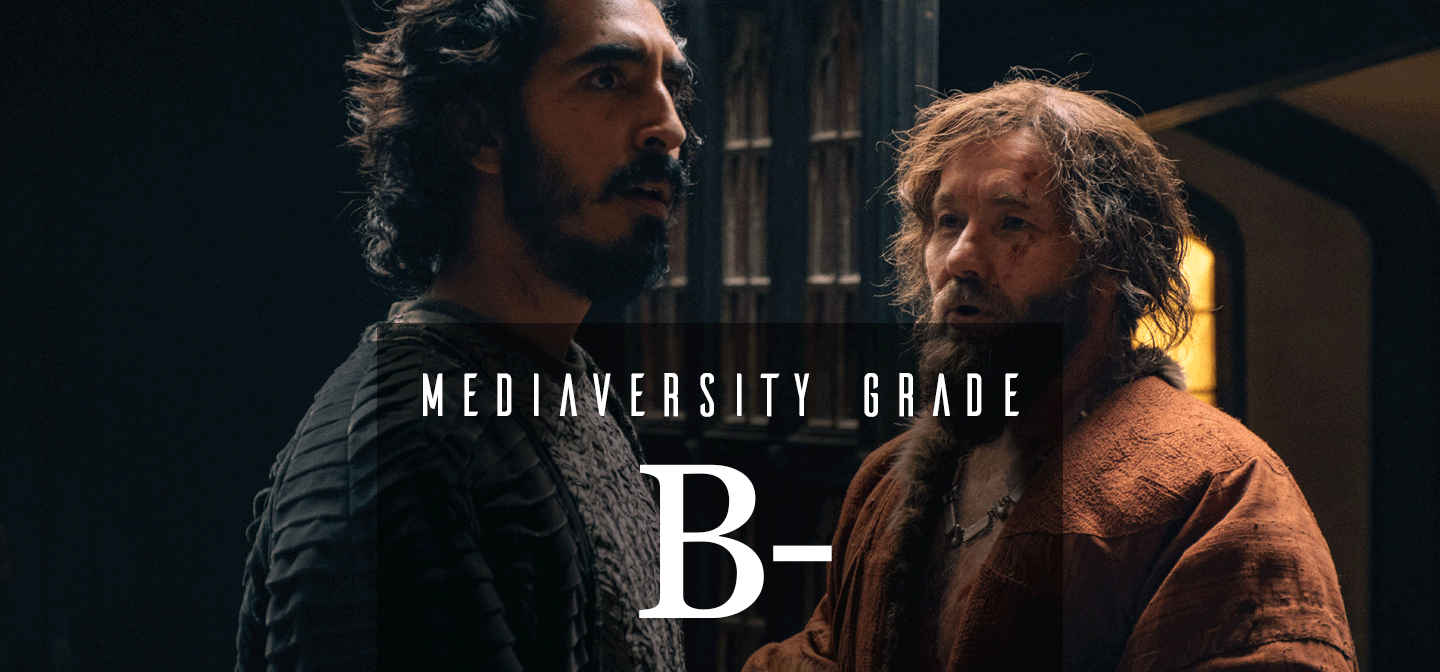The Green Knight
“It’s possible to appreciate the instances of colorblind casting that increase opportunities for actors of color, so long as we don’t stop there.”
Title: The Green Knight (2021)
Director: David Lowery 👨🏼🇺🇸
Writer: David Lowery 👨🏼🇺🇸
Reviewed by Alicja Johnson 👩🏼🇺🇸
Technical: 4/5
If you’ve ever wondered what constitutes “a critic’s film,” look no further than The Green Knight. Many viewers will find picking apart director David Lowery’s choices and debating his thesis to be more exciting than actually watching the movie. Though the 14th-century story sends King Arthur’s nephew, Sir Gawain (Dev Patel), on a long journey to prove his honor, Lowery’s adaptation sidesteps the racing tempo typical of adventure movies. Instead, watching The Green Knight feels like plunging into a weighty dream—not quite a nightmare, but the sort of reverie that makes you wake up feeling strange.
The dramatically lit Irish countryside and pensive long shots make every frame a sight to behold, but the film would be far less watchable if not for Patel. Even when Gawain is the only character on screen, Patel ensures we have plenty to look at, wordlessly conveying the character’s thoughts and motivations. His otherworldly gravitas feels like coming face-to-face with an epic being, a perfect fit for the fantasy genre.
While The Green Knight’s medieval architecture and imagery will delight audiences familiar with Arthurian legend, the runtime may drag for those in search of a swashbuckling adventure. Clocking in at 130 minutes, a viewer would not be alone in thinking the film much, much longer. Regardless, Lowery’s breathtaking visuals and Patel’s force of presence are far from the worst place to spend any amount of time.
Gender: 2.5/5
Does it pass the Bechdel Test? NOPE
Arthurian legend regrettably tends to focus on kings and knights over maidens and enchantresses, a tradition that Lowery continues in The Green Knight. His characters feel allegorical at best, but the screenplay only makes a good faith effort at exploring Gawain, restricting the story’s women to the definition of “one-dimensional.”
Gawain’s mother (Sarita Choudhury), who fans of the original poem will recognize as the enchantress Morgan le Fay, gives us the most to work with. As the fabled Green Knight (Ralph Ineson) bursts into King Arthur’s Christmas celebration with the game that will set Gawain off on his quest, Lowery crosscuts the scene with images of his mother performing an occult ritual, implying that her magic drives the film’s inciting event. Most iterations of the source material eventually confirm Morgan’s role in testing her son’s honor, as opposed to the mere implication that Lowery provides in his version. In all fairness, the director appears to favor leaving his film open to interpretation, but the lack of specificity mostly feels like a missed opportunity to validate Gawain’s mother as a female character with agency.
Lowery’s choice to fixate his story on Gawain could explain why almost everything we learn about any given woman involves the young knight-to-be. The noteworthy exception would be Winifred (Erin Kellyman), a ghost who tells Gawain her tragic story of being decapitated when he feverishly stumbles upon her ramshackle cabin. But even in this case, the only background we get about Winifred is that a man murdered her. In a movie that takes artistic liberty with its source material, both in storytelling and casting, it’s disappointing that Lowery doesn’t see fit to modernize its women, too.
Race: 4/5
Between The Personal History of David Copperfield (2020) and The Green Knight, Patel sticks the landing in roles traditionally reserved for white men. Some hailed his performance in the Dickens classic as proof that colorblind casting works, but the practice is just a superficial solution. The Green Knight only reminds us of this fact.
In a piece for Vulture, writer Nicholas Russell muses about where on the spectrum of inclusivity The Green Knight falls by casting the English-born son of Gujarati Indian Hindus in a typically white role: “Lowery’s casting is inspired for giving Patel a role worthy of his talents, but it is hardly subversive—and not every project that implements nontraditional casting needs to be.” Russell goes on to note that The Green Knight cares little about the historical context of British imperialism, concluding that the film “makes a case for imagination.” And why shouldn’t it? Camelot is a fantasy, after all, so need there be real-world racial dynamics?
The answer doesn’t come easily, as Patel’s culturally vague role in The Green Knight has its benefits and drawbacks. For one thing, Patel himself valued the chance to step into the shoes of this particular character. But there’s also the concern that depicting a fantasy version of Britain without imperialism glosses over the country’s historical mistreatment of people of color. A slight unease can accompany seeing an Indian actor playing a predecessor of the British colonizers who would go on to exploit India.
All in all, it’s possible to appreciate the instances of colorblind casting that increase opportunities for actors of color, so long as viewers and creators don’t stop there. Real representation requires narratives that don’t suppress an actor’s ethnicity, but rather embrace it and integrate it into the character.
Mediaversity Grade: B- 3.50/5
It’s doubtful that Lowery gave much thought to inclusive storytelling beyond hiring a few actors of color, and that shows. Maybe in the next Arthurian legend to hit the screen, some of Camelot’s women will finally get their due.




